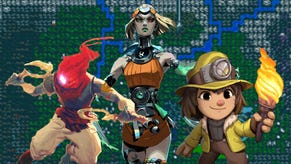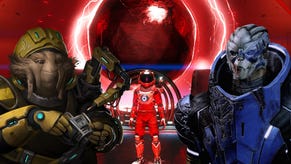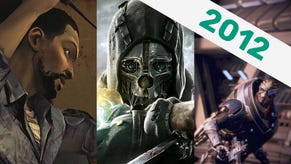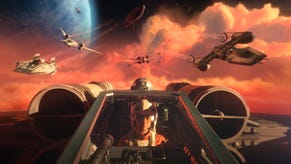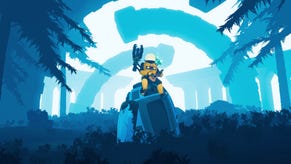Interview: Subset Games Talk FTL
The Space Race
Last week Adam posted some impressions of the spaceship managing FTL, and you're allowed to read them. And now, Craig's spoken with its creators, Justin Ma and Matthew Davis. They talk about how the project came to be, how they're still in shock over their massive Kickstarter success, and how it was that the game was inspired by text adventures.
RPS: Can you tell me a little bit about yourselves: how you met, how you got into game development, what you worked on before going indie?
Justin Ma: We were both working in a larger game studio in Shanghai, China. I had been a game designer on a few projects I didn’t feel strongly about and got more satisfaction out of my side projects: little experiments using GameMaker. Matt and I got along quickly but we really bonded over playing boardgames with a number of friends.
Matthew Davis: I got a degree in computer science before going to work at the game studio where Justin and I met. Like Justin, I had trouble getting excited about the projects we were working on. Going indie seemed to make sense since we covered most of the necessary skill requirements between us, and China was an affordable place to live.
RPS: Where did the idea spring from, how has it evolved over time?
Matthew Davis: When we were trying to decide what sort of game to make, we had been playing a couple of board games that focused on running a ship instead of flying it and I had been working my way through a Deep Space Nine boxset. Those led to the initial idea to replicate the feeling of being the captain on a starship. In any given episode of Star Trek, the captain is always yelling “Reroute power to shields!” or telling the engineer what to do now that their Warp Core is on fire. We wanted that experience, as opposed to the “dog fighting in space” that most videogames focus on. We wanted a game where we had to manage the crew, fix the engines, reroute power to shields, target the enemy life support, and then figure out how to repel the boarders that just transported over!
Justin Ma: This abstract player experience was clear goal from the start but the details of how the game would function were entirely up in the air. We didn’t have a lot of examples to draw from when designing the actual user interactions so early on it felt like there were an infinite number of directions we could take the game. It was freeing and somewhat terrifying at the same time.
RPS: There are some obvious influences, Star Trek being the one I run in my head when I keep booting it up. What have you been inspired by and why do they resonate with you?
Matthew Davis: The obvious TV show/movies (Star Trek, Battlestar Galactica, Firefly, Star Wars, etc.) were definitely big inspirations. They gave us the atmosphere and experience we wanted to create. Ships seem so fragile in those shows, just one hit (despite “shields at 80%”) results in smoke and destruction. We wanted to replicate the tension and danger of space exploration so every decision the player makes feels vital for the survival of their fragile ship and crew.
For the actual game design, details were pulled from the hundreds of games we've played growing up... ranging from classics like Fallout and X-Wing to more modern inspirations like Mass Effect.
RPS: Any surprising influences?
Justin Ma: It may not be surprising since I say it often, but Spelunky was an experience we drew from frequently. Other than being an excellent game, I feel Derek Yu really figured out the formula for distilling the spirit of Roguelikes into another genre.
Matthew Davis: King Arthur the Roleplaying Wargame would probably be a surprising influence. It reminded me how fun and diverse entirely text-based adventures can be. And it has a brilliantly crafted atmosphere that really immerses you into a role, which I hope FTL manages to do as well.
RPS: The game seemed pretty playable from the IGF/Onlive build. How much of what you want to achieve did it represent, and how far along is the current Steam-served beta?
Matthew Davis: That IGF build represented the core gameplay and experience that we set out to make last year. Since then, we've been iterating and expanding on what we already had. The focus since then has been fleshing out the universe with more aliens and events. And since a rogue-like lives and dies on re-playability, we've also been making sure the game has enough variety to ensure the player wants to keep coming back for more adventures. Some people in the Beta have already invested 40+ hours into the game, so I'd cautiously say that so far it seems to be worth coming back to over and over again.
RPS: Capturing that feel of a working spaceship, but keeping it simple is a really smart move. I'd probably fear the game a little if rerouting powerthrough systems were any more complicated: it would be about the systems more than the stories each game generates. The current set-up feels like it feeds right into you playing a game then turning around and telling someone "did you see that?"
Justin Ma: We love complex gameplay mechanics but we hate how they can often lead to a cumbersome interface. We wanted each mechanic to be simple to understand and manage but allow multiple mechanics to interact with each other in complex ways. Therefore situations such as when your ship is on fire, your life support is down, your crew is fighting on the cloaked enemy ship and a boarding drone just crashed through your hull are not entirely overwhelming. Each of these problems may have a simple solution, it’s just up to the player to find a way to figure out the best way to do so.
RPS: I'd like to hear a thrilling tale of space derring-do. Do you have a favourite moment from playing it?
Justin Ma: Recently I had a rough fight in an asteroid field and had to jump away with a number of my systems being damage. However, at the next beacon I was immediately attacked and boarded by a rebel ship. The boarders were in my weapons system and attacking it so I made a hasty decision: I teleported my few surviving crew members onto the enemy ship while locking down our blast-doors and using a bomb to make a hull breach in the weapons room of my own ship. While the boarders were suffocating, I finished off their ship's remaining crew and disabled their weapons. I was able to win a fight I thought I would surely lose in a matter of moments.
RPS: You started pretty low and ended pretty high on Kickstarter: what were you initially hoping Kickstarter would provide? What was the plan for those funds?.
Justin Ma: We had been living very cheaply for the first year of development but even so our savings were wearing thin. We needed the money to formally set up the company, buy licenses and pay our sound guy for his work that had been mostly pro bono. I thought hitting our goal of 10k was not unreasonable and when I felt particularly optimistic I hoped for 18-20k.
Matthew Davis: I wasn't sure what to expect from the Kickstarter. $10k sounded like a healthy, reasonable goal, and the $200k we achieved is still difficult to believe despite it being months later.
RPS: And now? Are there grand plans? Can you point to a part of the game that will benefit more than you'd thought?
Justin Ma: Since we were so close to a finished product we didn’t have the leisure to rethink our entire development plan. That being said, we greatly expanded numerous aspects of the game. It's been great to have the freedom to purchase a good sound library without feeling guilty or eating ramen daily. Our writer consultant, Tom Jubert, has helped us flesh out the setting and has added a lot of character to the various alien races. We’ve been working with Ben Prunty to greatly expand the game’s music. The tracks now dynamically change as you go back and forth from combat to exploration, which has really helped the atmosphere. And perhaps the biggest benefit was that the Kickstarter allowed us to get our Beta on Steam so we could have extensive testing over the past few weeks.
RPS: What sort of budget were you working on before?
Matthew Davis: We didn't really set out with much of a plan or a budget. We had some extra time and savings, and we thought we'd try to make something and see if it was fun. For me, it started as more of a learning experience and test of our skills than anything. The favorable reaction from IGF is what drove us forward on it.
Justin Ma: Essentially our budget was just how much rent, food and utilities cost for a year in Shanghai.
RPS: Any additional pressure now that you have money from players to 'finish' the game?
Matthew Davis: Of course. The responsibility to make a great game for our backers is an immense pressure that we're taking very seriously. It's been a stressful couple months but it's been a lot of fun seeing people enjoy the Beta.
RPS: The reward tiers must take up time and money to fulfill. How are you dealing with them?
Justin Ma: We were conservative with our rewards and most can be delivered online. However, a number of the rewards will have to wait until after the initial release when we are not in a game development crunch mode.
RPS: Kirk, Picard, Adama, or Reynolds?
Justin Ma: Picard.
Matthew Davis: Kirk




